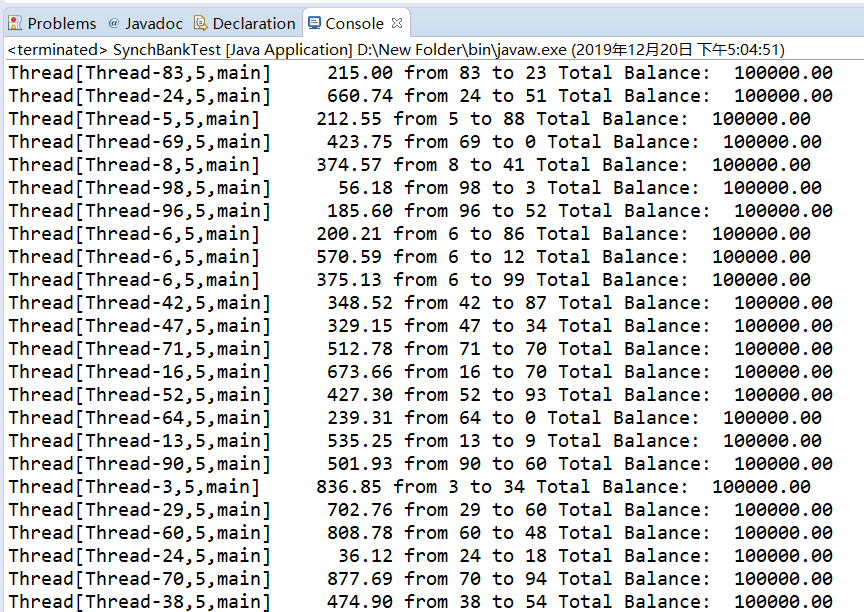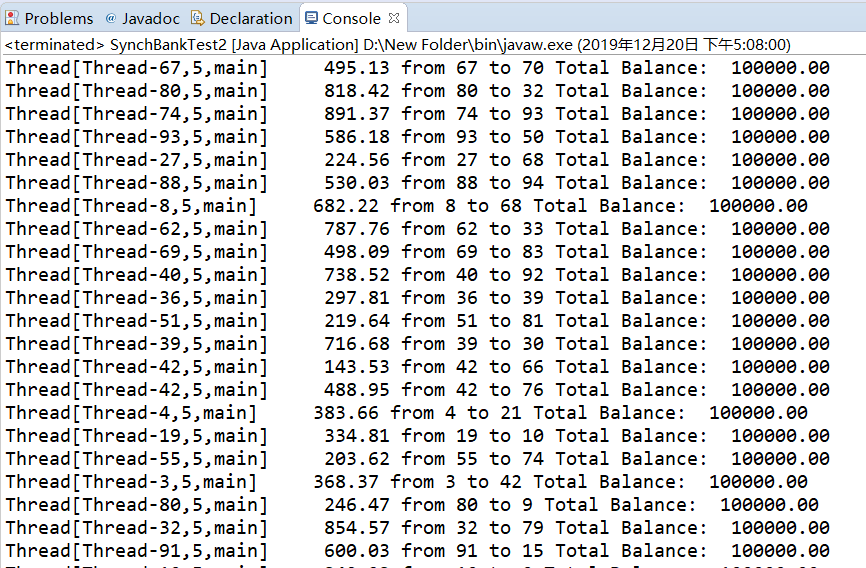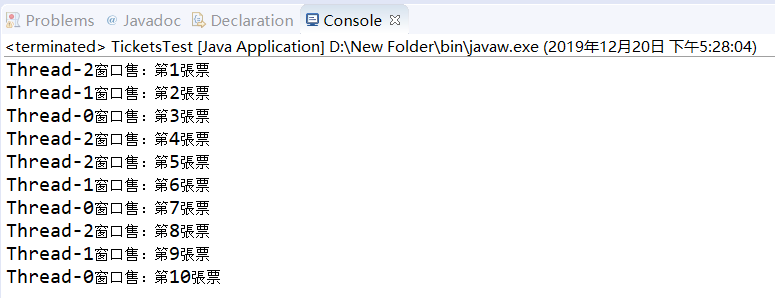201871010111-刘佳华《面向对象程序设计(java)》第十七周学习总结
201871010111-刘佳华《面向对象程序设计(java)》第十七周学习总结
实验十七 线程同步控制
实验时间 2019-12-20
第一部分:理论知识总结
16.Java 的线程调度采用优先级策略:
优先级高的先执行,优先级低的后执行;
多线程系统会自动为每个线程分配一个优先级,缺省时,继承其父类的优先级;
任务紧急的线程,其优先级较高; 同优先级的线程按“先进先出”的队列原则。
调用setPriority(int a)重置当前线程的优先级,a取值可以是前述的三个静态量。
调用getPriority()获得当前线程优先级。
多线程并发运行不确定性问题解决方案:引入线程同步机制,使得另一线程要使用该方法,就只能等待。
在Java中解决多线程同步问题的方法有两种:Java SE 5.0中引入ReentrantLock类。 在共享内存的类方法前加synchronized修饰符。
用ReentrantLock保护代码块的基本结构如下:
myLock.lock();
try {
critical section
}
finally
{
myLock.unlock();
}
有关锁对象和条件对象的关键要点:
1.锁用来保护代码片段,保证任何时刻只能有一个线程执行被保护的代码。
2.锁管理试图进入被保护代码段的线程。
3.锁可拥有一个或多个相关条件对象。
4.每个条件对象管理那些已经进入被保护的代码 段但还不能运行的线程。
synchronized关键字作用: 某个类内方法用synchronized 修饰后,该方法被称为同步方法;只要某个线程正在访问同步方法,其他线程欲要访问同步方法就被阻塞,直至线程从同 步方法返回前唤醒被阻塞线程,其他线程方可能进入同步方法。
在同步方法中使用wait()、notify 和notifyAll()方法:
一个线程在使用的同步方法中时,可能根据问题的需要,必须使用wait()方法使本线程等待,暂时让出CPU的使用权,并允许其它线程使用这个同步方法。
线程如果用完同步方法,应当执行notifyAll()方法通知所有由于使用这个同步方法而处于等待的线程结束等待。
第二部分:实验部分
1、实验目的与要求
(1) 掌握线程同步的概念及实现技术;
(2) 线程综合编程练习
2、实验内容和步骤
实验1:测试程序并进行代码注释。
测试程序1:
l 在Elipse环境下调试教材651页程序14-7,结合程序运行结果理解程序;
l 掌握利用锁对象和条件对象实现的多线程同步技术。
1 package synch; 2 3 import java.util.*; 4 import java.util.concurrent.locks.*; 5 6 /** 7 * A bank with a number of bank accounts that uses locks for serializing access. 8 * @version 1.30 2004-08-01 9 * @author Cay Horstmann 10 */ 11 public class Bank 12 { 13 private final double[] accounts; 14 /**与同步控制有关的类对象*/ 15 private Lock bankLock; //lock对象 16 private Condition sufficientFunds;//condition对象 17 18 /** 19 * Constructs the bank. 20 * @param n the number of accounts 21 * @param initialBalance the initial balance for each account 22 */ 23 public Bank(int n, double initialBalance) 24 { 25 accounts = new double[n]; 26 Arrays.fill(accounts, initialBalance); //数组account的填充 27 bankLock = new ReentrantLock(); 28 sufficientFunds = bankLock.newCondition(); 29 } 30 31 /** 32 * Transfers money from one account to another. 33 * @param from the account to transfer from 34 * @param to the account to transfer to 35 * @param amount the amount to transfer 36 */ 37 public void transfer(int from, int to, double amount) throws InterruptedException //模拟行内转账操作 38 { 39 bankLock.lock(); //加锁操作 40 try 41 { 42 while (accounts[from] < amount) 43 sufficientFunds.await(); //阻塞事件队列 44 System.out.print(Thread.currentThread()); 45 accounts[from] -= amount; 46 System.out.printf(" %10.2f from %d to %d", amount, from, to); 47 accounts[to] += amount; 48 System.out.printf(" Total Balance: %10.2f%n", getTotalBalance()); 49 sufficientFunds.signalAll();//唤醒所有线程 50 } 51 finally 52 { 53 bankLock.unlock(); //解除锁操作 54 } 55 } 56 57 /** 58 * Gets the sum of all account balances. 59 * @return the total balance 60 */ 61 public double getTotalBalance() 62 { 63 bankLock.lock(); 64 try 65 { 66 double sum = 0; 67 68 for (double a : accounts) 69 sum += a; 70 71 return sum; 72 } 73 finally 74 { 75 bankLock.unlock(); 76 } 77 } 78 79 /** 80 * Gets the number of accounts in the bank. 81 * @return the number of accounts 82 */ 83 public int size() 84 { 85 return accounts.length; 86 } 87 }
package synch; /** * This program shows how multiple threads can safely access a data structure. * @version 1.31 2015-06-21 * @author Cay Horstmann */ public class SynchBankTest { public static final int NACCOUNTS = 100; public static final double INITIAL_BALANCE = 1000; public static final double MAX_AMOUNT = 1000; public static final int DELAY = 10; public static void main(String[] args) { Bank bank = new Bank(NACCOUNTS, INITIAL_BALANCE); for (int i = 0; i < NACCOUNTS; i++) { int fromAccount = i; Runnable r = () -> { try { while (true) { int toAccount = (int) (bank.size() * Math.random()); double amount = MAX_AMOUNT * Math.random(); bank.transfer(fromAccount, toAccount, amount); Thread.sleep((int) (DELAY * Math.random()));//随机生成时间,使正在执行的线程休眠 } } catch (InterruptedException e) { } }; Thread t = new Thread(r); t.start(); } } }
运行截图:

测试程序2:
l 在Elipse环境下调试教材655页程序14-8,结合程序运行结果理解程序;
l 掌握synchronized在多线程同步中的应用。
package synch2; import java.util.*; /** * A bank with a number of bank accounts that uses synchronization primitives. * @version 1.30 2004-08-01 * @author Cay Horstmann */ public class Bank { private final double[] accounts; /** * Constructs the bank. * @param n the number of accounts * @param initialBalance the initial balance for each account */ public Bank(int n, double initialBalance) { accounts = new double[n]; Arrays.fill(accounts, initialBalance); } /** * Transfers money from one account to another. * @param from the account to transfer from * @param to the account to transfer to * @param amount the amount to transfer */ public synchronized void transfer(int from, int to, double amount) throws InterruptedException//sysynchronized关键字修饰方法实现加锁操作 { while (accounts[from] < amount) wait(); //wait()方法导致线程进入等待状态直到它被通知,该方法只能在一个同步方法中调用 System.out.print(Thread.currentThread());//Thread.currentThread()返回当前执行线程的Thread对象 accounts[from] -= amount; System.out.printf(" %10.2f from %d to %d", amount, from, to); accounts[to] += amount; System.out.printf(" Total Balance: %10.2f%n", getTotalBalance()); notifyAll(); //解除那些在该对象上调用wait方法的线程的阻塞状态 } /** * Gets the sum of all account balances. * @return the total balance */ public synchronized double getTotalBalance() { double sum = 0; for (double a : accounts) sum += a; return sum; } /** * Gets the number of accounts in the bank. * @return the number of accounts */ public int size() { return accounts.length; } }
package synch2; /** * This program shows how multiple threads can safely access a data structure, * using synchronized methods. * @version 1.31 2015-06-21 * @author Cay Horstmann */ public class SynchBankTest2 { public static final int NACCOUNTS = 100; public static final double INITIAL_BALANCE = 1000; public static final double MAX_AMOUNT = 1000; public static final int DELAY = 10; public static void main(String[] args) { Bank bank = new Bank(NACCOUNTS, INITIAL_BALANCE); for (int i = 0; i < NACCOUNTS; i++) { int fromAccount = i; /**lamber表达式*/ /*Runnable r = () -> { try { while (true) { int toAccount = (int) (bank.size() * Math.random()); double amount = MAX_AMOUNT * Math.random(); bank.transfer(fromAccount, toAccount, amount); Thread.sleep((int) (DELAY * Math.random())); } } catch (InterruptedException e) { } };*/ /**直接声明 * Runnable r=new Runnable() { @Override public void run() { try { while (true) { int toAccount = (int) (bank.size() * Math.random()); double amount = MAX_AMOUNT * Math.random(); bank.transfer(fromAccount, toAccount, amount); Thread.sleep((int) (DELAY * Math.random())); } } catch (InterruptedException e) { } }; };*/ /** * 匿名内部类 */ Thread t = new Thread(new Runnable(){ @Override public void run() { try { while (true) { int toAccount = (int) (bank.size() * Math.random()); double amount = MAX_AMOUNT * Math.random(); bank.transfer(fromAccount, toAccount, amount); Thread.sleep((int) (DELAY * Math.random())); } } catch (InterruptedException e) { } }; }); t.start(); } } }
运行结果:

测试程序3:
l 在Elipse环境下运行以下程序,结合程序运行结果分析程序存在问题;
l 尝试解决程序中存在问题。
|
class Cbank { private static int s=2000; public static void sub(int m) { int temp=s; temp=temp-m; try { Thread.sleep((int)(1000*Math.random())); } catch (InterruptedException e) { } s=temp; System.out.println("s="+s); } }
class Customer extends Thread { public void run() { for( int i=1; i<=4; i++) Cbank.sub(100); } } public class Thread3 { public static void main(String args[]) { Customer customer1 = new Customer(); Customer customer2 = new Customer(); customer1.start(); customer2.start(); } } |
源代码运行截图:

会发现源代码运行结果错误;这是由于多线程并发执行过程(两个或者两个以上的线程共享某个对象,每一个对象都调用该对象的状态方法)中存在问题:
1.多线程的相对执行顺序不确定
2.执行顺序的不确定会产生执行结果的不确定性
3.在多线程对于共享数据的操作时常常会产生不确定性
修改后代码(采用关键字synchronized修饰方法修改程序)
package op; class Cbank { private static int s=2000; public synchronized static void sub(int m) { int temp=s; temp=temp-m; try { Thread.sleep((int)(1000*Math.random())); } catch (InterruptedException e) { } s=temp; System.out.println("s="+s); } } class Customer extends Thread { public void run() { for( int i=1; i<=4; i++) Cbank.sub(100); } } public class Thread3 { public static void main(String args[]) { Customer customer1 = new Customer(); Customer customer2 = new Customer(); customer1.start(); customer2.start(); } }
运行截图:

实验2 编程练习
利用多线程及同步方法,编写一个程序模拟火车票售票系统,共3个窗口,卖10张票,程序输出结果类似(程序输出不唯一,可以是其他类似结果)。
Thread-0窗口售:第1张票
Thread-0窗口售:第2张票
Thread-1窗口售:第3张票
Thread-2窗口售:第4张票
Thread-2窗口售:第5张票
Thread-1窗口售:第6张票
Thread-0窗口售:第7张票
Thread-2窗口售:第8张票
Thread-1窗口售:第9张票
Thread-0窗口售:第10张票
1.设计思路:出票时三个窗口并行造作,可抽象为三个线程并行占用cpu,可以利用关键字synchronized使得实现并发操作。
一、当两个并发线程访问同一个对象object中的这个synchronized(this)同步代码块时,一个时间内只能有一个线程得到执行。另一个线程必须等待当前线程执行完这个代码块以后才能执行该代码块。
二、然而,当一个线程访问object的一个synchronized(this)同步代码块时,另一个线程仍然可以访问该object中的非synchronized(this)同步代码块。
三、尤其关键的是,当一个线程访问object的一个synchronized(this)同步代码块时,其他线程对object中所有其它synchronized(this)同步代码块的访问将被阻塞。
四、第三个例子同样适用其它同步代码块。也就是说,当一个线程访问object的一个synchronized(this)同步代码块时,它就获得了这个object的对象锁。结果,其它线程对该object对象所有同步代码部分的访问都被暂时阻塞。
五、以上规则对其它对象锁同样适用.
3.整体实验代码:
package TeamWork06; class Ticketsthread implements Runnable { public static final int DELAY = 1000; int t = 1; boolean flag = true; public void run() { while (flag) { try { Thread.sleep((int) (DELAY * Math.random())); } catch (InterruptedException e) { e.printStackTrace(); } synchronized (this) { if (t <= 10) { System.out.println(Thread.currentThread().getName() + "窗口售:第" + t + "張票"); t++; } if (t > 10) { flag = false; } } } } } public class TicketsTest { public static void main(String[] args) { Ticketsthread th = new Ticketsthread(); new Thread(th).start(); new Thread(th).start(); new Thread(th).start(); } }
运行截图:

第三部分:实验心得
通过本周的学习,了解到了解决多线程同步问题的两种方法:ReentrantLock类和synchronized修饰符,理解了其使用方法,能够使用简单的编程实现方法的使用来处理并发问题.在实验课上收获了当注释调代码sufficientFunds.await();会出现死锁状态等知识,感受颇多。注意点有:线程如果用完同步方法,应当执行notifyAll()方 法通知所有由于使用这个同步方法而处于等待的 线程结束等待。线程如果用完同步方法,应当执行notifyAll()方 法通知所有由于使用这个同步方法而处于等待的 线程结束等待。以后会坚持学习Java。


 浙公网安备 33010602011771号
浙公网安备 33010602011771号